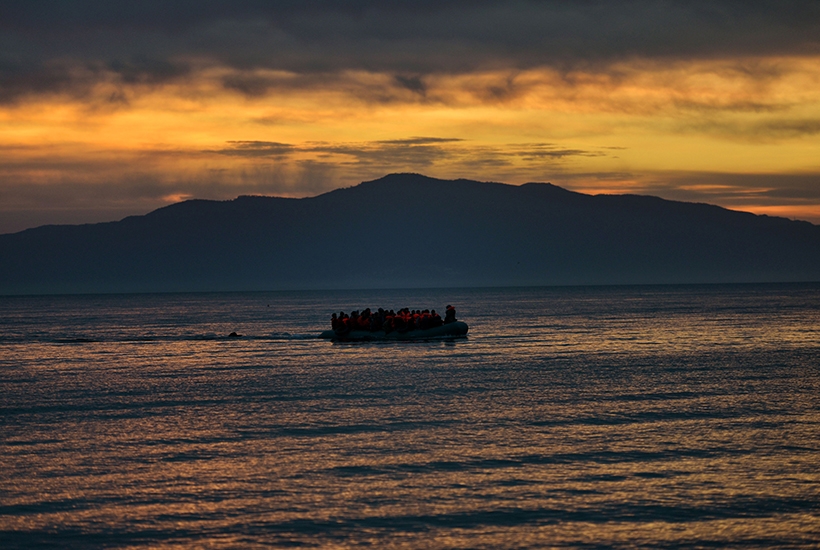I keep thinking what I’ll do when we regain our liberty — and I picture that beer at the end of Ice Cold in Alex, when after surviving his trek through the Sahara, a sweaty John Mills traces his finger up the frosted schooner, drinks the golden liquid down in one and says: ‘Worth waiting for.’ A month ago I had big ambitions for the future at home on the farm in Kenya. We were planting thousands of avocado trees, we were about to start rearing organic broiler chickens, there was a tilapia farm to expand, a new dairy project, and preparations for the Nairobi livestock breeders’ show later this year, when we hoped to compete with a string of Boran beef cattle. The event was cancelled and all my farm plans were delayed when the flights home to Kenya were closed. Since then we have been hunkering down at our friends Jon and Lou’s lovely house in Fitzrovia, beneath the BT Tower that looms above us like the Eye of Sauron, blaring its endless slogans.
People in the UK will soon be paying traffickers to send them south across the Mediterranean on inflatable rafts
We can’t go home let alone stay in it, but with my team of Kenyan staff managing the farm things are okay. I get reports about calving, machinery repairs and how much rain we had overnight. I saw a video of a swarm of locusts passing over the farmstead, billions of insects creating a halo around the sun at noon. One night a lion leapt over the wall of the boma, the night enclosure where the cattle sleep, and our stockman Leshoomo bravely chased it away as it was trying to seize a calf. I miss the paradise flycatcher who flits about the branches outside our bedroom, the way the mist hangs in the valley at dawn, dipping day at the crush, the taste of vegetables from our own garden and all the other things one loves about home. Most of all I miss walking with our three dogs and I feel such joy and envy when I see the lucky people who have a spaniel or a poodle to muck about with in Regent’s Park.
As soon as the airspace reopens and the draconian quarantine measures are lifted, I will be on a flight back to Nairobi. I now regard Africa as the place where a person can find the most liberty in this dystopian world. Many states across the continent imposed lockdowns, I guess because they looked at what was happening elsewhere and assumed this was the correct thing to do. But Africans are swiftly waking up to the fact that destroying their economies for the sake of a disease that is simply not that dangerous is a poor decision. From Burkina Faso to Rwanda, Africans are wisely re-opening their countries. The claustrophobia of London is emphasised by the news that even Saudi Arabia now extends more liberty to its citizens than the British government allows its people. At this rate, Nigeria will soon be a wealthier, more dynamic economy than the United Kingdom, and people here will be so desperate they will pay traffickers to send them south across the Mediterranean on inflatable rafts to seek employment as traffic wardens in Lagos.
I personally suspect the pollsters are lying when they claim that most British people want the lockdown to continue. My aunt Beryl, 92, isn’t keen. My father-in-law Gerry is dying of boredom without sport on the TV or a round of golf at his local club. Our teenage children Eve and Rider are tired of being cooped up with the their parents, unable to get on with their lives. The friends I speak to every day on WhatsApp appear to be going rather mad. Loved ones who were already suffering depression before this interregnum have spiralled into dangerous states of anguish. What will happen when we all emerge from this like insects from the global chrysalis — what will our forthcoming instar look like?
I think it’s going to get extremely weird. Following the Black Death in 14th-century Europe, the mania we call St Vitus’ Dance spread like a contagion through society. Crowds of men and women cavorted involuntarily until their feet were lacerated and their bones snapped. They hallucinated, spoke in tongues, summoned demons, recoiled at the sight of red and said they were drowning in seas of blood. Modern doctors have blamed the hysteria — named after the patron saint of dancers, comedians and epileptics — on poisoning by ergot fungus, on bacterial infection, or the mass response to the stresses of surviving the plague. I feel sure there will be revolutions and upheavals across the world and we will see things happen in England that take us all by surprise. It may not be such a bad thing and life is certainly going to get very interesting.







Comments